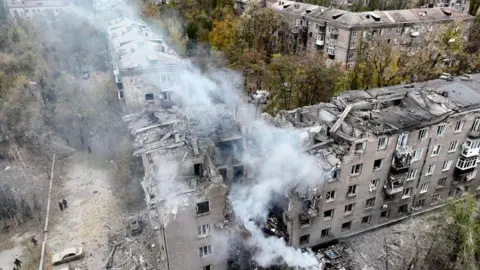The Kremlin has denied media reports that US President-elect Donald Trump held a call with Vladimir Putin, in which he is said to have warned the Russian president against escalating the war in Ukraine.
The call, which was first reported by the Washington Post on Sunday, is said to have happened on Thursday.
Trump is also reported to have mentioned America’s extensive military presence in Europe to Putin.
A Kremlin spokesperson said the reports were “pure fiction”, while Trump’s team told the BBC that it would not comment on the president-elect’s “private calls”.
Trump’s communications director Steven Cheung told the BBC: “We do not comment on private calls between President Trump and other world leaders.”
But he said leaders had begun the process of contacting the president-elect.
Kremlin spokesperson Dmitry Peskov denied a conversation had taken place.
“This is completely untrue, it is pure fiction. That is, this is simply false information. There was no conversation,” Peskov said.
Trump has promised to end the nearly three-year long war in Ukraine, but has yet to outline how he intends to do so.
Zelensky has previously warned against conceding land to Russia and has said that without US aid, Ukraine would lose the war.
While Peskov on Sunday spoke to Russian state media of “positive” signals from the incoming US administration, others say they trust the future president will not abandon Ukraine.
They include John Healey, the British defence secretary, who said he expected the US “to remain alongside allies like the UK, standing with Ukraine for as long as it takes to prevail over Putin’s invasion”.
On Sunday, during a visit to Ukraine, EU foreign policy chief Josep Borrell warned that any end to the war needed to be sustainable.
“This is a warning for the ones who say, this war has to end, so let’s finish it as soon as possible no matter how. How matters,” he said.
In Washington, US National Security Adviser Jake Sullivan said outgoing president Joe Biden would make the case to Trump that walking away from Ukraine would mean greater instability in Europe.
On Monday, Germany’s Foreign Minister, Annalena Baerbock, warned that Putin could take advantage of the US post-election transition period to press Moscow’s advantage in Ukraine.
Urging Berlin and fellow European Union member states to increase aid to Kyiv, she said: “We don’t have time to wait until spring. Now is the transition phase that Putin has been waiting for and aiming for.”
A dam close to the front line in Ukraine’s eastern Donetsk region was damaged on Monday, according to regional head Vadym Filashkin.
Filashkin said the Kurakhove reservoir’s dam was hit by a Russian strike, warning rising water “potentially threatens” settlements on the Vovcha River. Russia claimed Ukraine was responsible.
Last week, Russia and Ukraine launched their largest drone attacks since the start of the war.

Russia’s defence ministry said it intercepted 84 Ukrainian drones over six regions, including some approaching Moscow, which forced flights to be diverted from three of the capital’s major airports.
Ukraine’s air force said Russia launched 145 drones towards every part of the country on Saturday night, with most shot down.
On Monday, at least six people were killed and 21 others injured in Ukraine following the latest series of air strikes by Russia.
Russia, meanwhile, said it had destroyed 13 Ukrainian drones near the western regions of Kursk and Belgorod. It reported no deaths.
“Every day, every night, Russia unleashes the same terror,” Zelensky wrote on Twitter following Monday’s strike.
“More and more civilian sites are being targeted. Russia only wants to continue the war, and each of its strikes negates any claims of diplomacy from Russia.”
Zelensky asked for “stronger global support” and more weapons to stop Russian aggression.
Elsewhere, Moscow’s defence ministry said its forces had captured the village of Kolisnykivka in the Kharkiv region.
Russian territorial gains in October were the largest since March 2022, according to analysis of Institute for the Study of War data by the AFP news agency.
BBC






